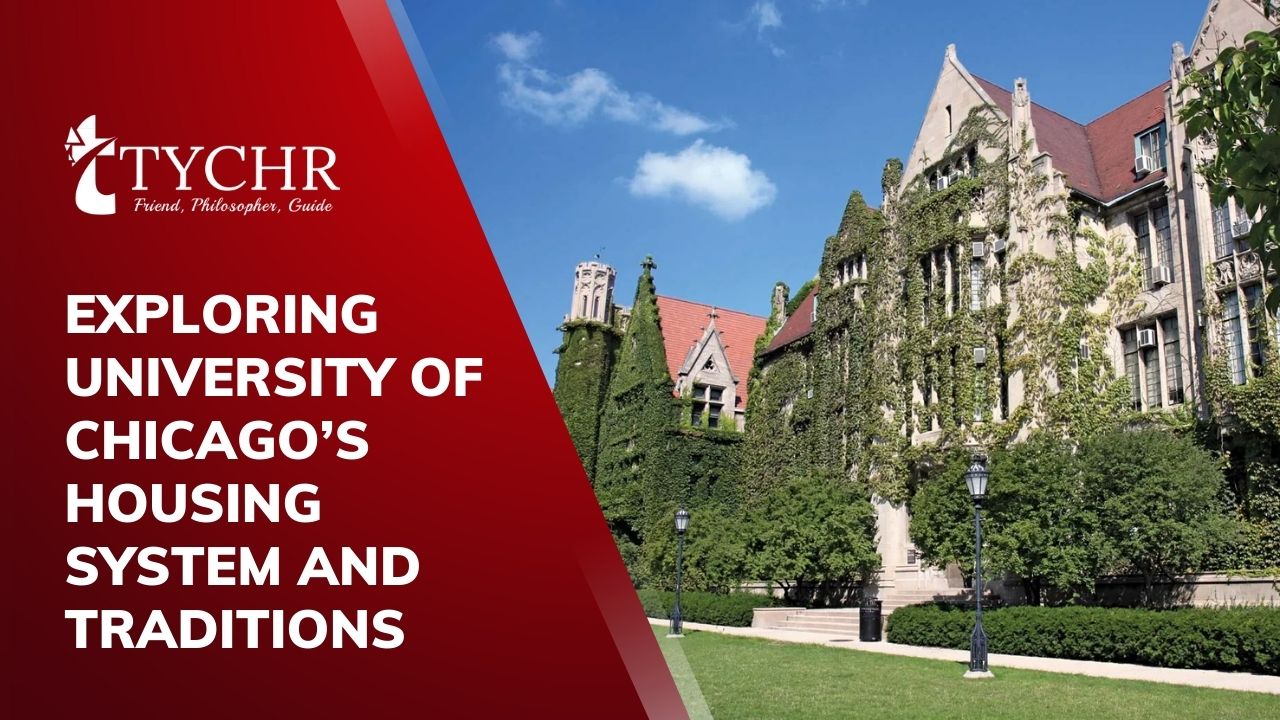Table of Contents
The University of Chicago is renowned not only for its rigorous academics and intellectual pursuits but also for its unique House System, which plays a pivotal role in fostering a close-knit community within the larger university. This distinctive residential system provides students with the opportunity to live and learn alongside their peers, creating a supportive environment that promotes personal growth, academic success, and lasting friendships. This unique housing system also provides its vibrant campus life, where students come together to celebrate a rich tapestry of traditions and events that make their college experience truly unforgettable. From wacky and whimsical to intellectually stimulating, these traditions contribute to the unique spirit and sense of community that sets the University of Chicago apart.
The House System
At the heart of the House System is the concept of residential communities, each with its own distinct identity and traditions. Students are randomly assigned to one of the university’s undergraduate houses, including Burton-Judson, Max Palevsky, South Campus, and Stony Island. Each house offers a range of housing options, from traditional residence halls to apartment-style living, accommodating students’ preferences and needs. This unique residential setup fosters a sense of belonging and camaraderie, as students navigate their college journey together.
One of the key benefits of the House System is the opportunity for mentorship and academic support. Within each house, students are assigned Resident Heads, faculty members, or staff who live in the house and act as mentors, providing guidance and support throughout the students’ college experience. These mentors offer academic advice, help students navigate university resources, and create a supportive network that promotes personal and intellectual growth. For example, in Max Palevsky House, Resident Heads organize regular study groups and host academic workshops, creating an environment where students can thrive academically.
The House System also promotes interdisciplinary learning and intellectual engagement. Many houses organize intellectual events, such as lectures, debates, and discussions, where students and faculty come together to explore various topics. These events foster a spirit of intellectual curiosity and provide opportunities for students to engage with different perspectives and ideas outside of the classroom. For instance, South Campus House hosts a monthly salon where students and faculty engage in thought-provoking conversations on topics ranging from philosophy to literature, creating an intellectual hub within the residential community.
Additionally, the House System encourages social and cultural activities that contribute to the vibrant campus life at the University of Chicago. Each house organizes its own events and traditions, ranging from formal dinners to game nights, talent shows, and themed parties. These activities not only provide opportunities for students to relax and socialize but also contribute to the creation of lasting friendships and a sense of belonging. For example, Burton-Judson House holds an annual “Burton-Judson Olympics,” where students participate in friendly competitions, forging bonds and creating memories that last long after graduation.
Living in a residential house also offers valuable networking opportunities. Students have the chance to connect with peers from diverse backgrounds, fostering a rich exchange of ideas and experiences. The House System promotes a sense of community that extends beyond the academic realm, allowing students to develop lifelong friendships with individuals they may not have otherwise met. These connections often extend beyond college, with alumni maintaining strong ties to their respective houses, reinforcing the sense of community and providing valuable networks for future endeavors.
Moreover, the House System ensures that students have access to comprehensive support services within their residential communities. Each house has dedicated staff who are readily available to assist students with various needs, including health and wellness resources, counseling services, and career guidance. This holistic support system ensures that students feel supported and cared for throughout their time at the University of Chicago.
The Traditions of UChicago
The housing system at the University of Chicago has played a crucial role in fostering the development of various unique traditions at the university. One reason for the development of unique traditions within the housing system is the close-knit nature of each residential house. The House System divides students into smaller communities, each with its own residential building and dedicated staff. This smaller-scale environment promotes closer interactions among students, creating a sense of camaraderie and shared experiences. Within these houses, students form tight bonds and establish traditions that reflect their collective interests, values, and passions.
One of the most iconic and eagerly anticipated events at the University of Chicago is Scav Hunt. As one of the largest and most renowned scavenger hunts in the world, Scav Hunt brings together students from all walks of life for a weekend of exhilarating challenges, creative problem-solving, and boundless fun. Each year, teams compete to complete an extensive list of items and tasks, ranging from the peculiar to the absurd. From constructing elaborate structures to performing outrageous acts, Scav Hunt pushes participants to their limits while fostering collaboration, teamwork, and a healthy dose of friendly competition. The traditions associated with Scav Hunt are deeply ingrained in the UChicago community, with alumni often returning to campus to relive the excitement and share their own Scav Hunt stories.
Another beloved tradition at UChicago is Kuviasungnerk, a celebration of the winter solstice that combines elements of Finnish and Native American culture. Kuviasungnerk, which translates to “Skiing and Singing,” brings students together to ski down the Midway Plaisance, a central park on campus, while singing traditional Finnish songs. The event is a colorful spectacle, with participants donning vibrant costumes and joining in the joyful singing and skiing. Kuviasungnerk exemplifies the University of Chicago’s commitment to embracing diverse cultural traditions and creating inclusive and joyous experiences for its students.
The annual Summer Breeze Festival is another highlight of the UChicago calendar. Held at the end of the academic year, this outdoor festival showcases the immense talent and creativity of UChicago’s student body. Students organize and perform in music concerts, dance performances, theatrical productions, and art exhibitions. The festival offers a platform for students to showcase their artistic skills, express their passions, and celebrate the culmination of a year’s worth of hard work. From captivating musical performances to thought-provoking art installations, Summer Breeze Festival exemplifies the depth and diversity of talent within the UChicago community.
Beyond these large-scale events, UChicago boasts a variety of unique rituals that have become cherished traditions. For example, every year during the winter quarter, the university holds the annual Latke-Hamentaschen Debate. This light-hearted and intellectually engaging event brings together faculty members from various disciplines to debate the merits of latkes (potato pancakes) versus hamantaschen (triangular pastries filled with poppy seeds or fruit). The debate is a playful nod to the university’s academic rigor while providing students and faculty with a chance to engage in lively and humorous discussions.
Another notable tradition is the annual Humans vs. Zombies game, where students participate in an exhilarating week-long game of tag. Players take on the roles of either humans or zombies and navigate the campus, strategizing and outsmarting one another. This immersive game fosters a sense of camaraderie, encourages teamwork and quick thinking, and offers a welcome break from the rigors of academic life.UChicago’s traditions extend beyond organized events and rituals. The university is also home to quirky traditions upheld by students themselves. For instance, the “Unofficial Guide to the University of Chicago” is a satirical student-produced publication that humorously reflects on various aspects of campus life. This tongue-in-cheek guide has become a beloved tradition, capturing the unique quirks and idiosyncrasies of the university with wit and humor.
To apply for housing at the University of Chicago, follow these general steps
- Research Housing Options: Visit the university’s housing website to explore the different housing options available to students. The university offers a variety of on-campus housing options, including residence halls, apartments, and houses, each with its own unique features and amenities.
- Review Application Process: Familiarize yourself with the application process and deadlines. The university typically has specific application periods during which you can submit your housing application. Make sure to note any required documents or additional information needed for the application.
- Access the Housing Portal: Log in to the university’s housing portal using your university credentials. This portal is typically where you will find all the necessary information and forms for the housing application process.
- Complete the Application Form: Fill out the housing application form with accurate and up-to-date information. The form will typically ask for personal details, housing preferences, and any specific requirements or accommodations you may need.
- Submit the Application Fee: Pay the required housing application fee, if applicable. The fee amount and payment method will be specified on the housing application website.
- Select Housing Preferences: If the university offers multiple housing options, indicate your preferences based on your desired location, roommate preferences, or specific amenities you are looking for in your housing assignment.
- Review and Confirm: Before submitting your application, review all the information you have provided to ensure its accuracy. Double-check your preferences and any additional requests you have made.
- Submit the Application: Once you are confident that your application is complete, submit it through the housing portal. Make sure to submit it before the specified deadline to be considered for housing.
- Await Housing Assignment: After the application period has ended, the university will review all applications and make housing assignments based on availability and preferences. You will receive notification of your housing assignment via email or through the housing portal.
- Confirm Housing Assignment: Once you receive your housing assignment, follow the instructions provided to confirm your acceptance. This may involve signing a housing agreement, submitting any required documentation, and paying any necessary deposits or fees.
These traditions and events are just a glimpse into the rich tapestry of campus life at the University of Chicago. They foster a strong sense of community, school spirit, and shared experiences that unite students from diverse backgrounds and disciplines. Whether it’s the exhilarating challenges of Scav Hunt, the cultural celebration of Kuviasungnerk, the artistic showcase of Summer Breeze Festival, or the intellectual banter of the Latke-Hamentashen Debate, these traditions shape the UChicago experience and create lifelong memories.
Conclusion
The House System at the University of Chicago is a cornerstone of the university’s vibrant campus culture. By providing students with a close-knit residential community, mentorship opportunities, academic support, and a plethora of social and intellectual activities, the House System creates an environment where personal growth, academic success, and lifelong friendships flourish. The real-life examples of students thriving in their respective houses demonstrate the transformative impact of the House System, making it a defining aspect of the University of Chicago experience. The University of Chicago’s traditions and events contribute to a vibrant and engaging campus culture that celebrates the unique spirit of the university. These traditions along with the housing system bring students together, foster a sense of community, and provide opportunities for personal growth, intellectual stimulation, and shared experiences. From Scav Hunt to Kuviasungnerk, from Summer Breeze Festival to the Latke-Hamentaschen Debate, UChicago’s traditions exemplify the university’s commitment to fostering a dynamic and inclusive campus environment. As students partake in these traditions, they become part of a legacy that spans generations, connecting them to the vibrant history and spirit of the University of Chicago.











